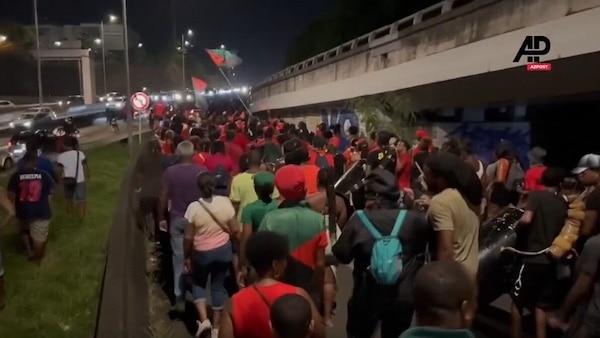The people of Martinique have taken to the streets throughout September to protest the cost of living crisis. In response, local authorities imposed a curfew, while the government in Paris approved the deployment of a special security forces unit (compagnie républicaine de sécurité, CRS) to the island—marking the first such action in over 60 years.
This move has been heavily criticized by local parliamentarians and left leaders in France. The CRS had been effectively banned from Martinique after their violent suppression of protests in 1959, which left three young people dead and sparked public outrage. The disregard for this ban, including by newly appointed Ministers of the Interior and for Overseas France, has been interpreted as a sign of deep disrespect toward the people of Martinique. Jean-Luc Mélenchon of France Unbowed condemned the move, stating it reflects the liberals’ and right-wing’s lack of understanding regarding the island’s relationship with mainland France.
The grievances behind the current protests are largely the same as those raised in previous demonstrations, including mass mobilizations in 2009, with the underlying feature being the colonial subjugation of the island by France in all areas of life. The difference in prices between mainland France and its so-called overseas territories is so striking that even the most basic necessities cost significantly more in Martinique than in Europe. This disparity is not mitigated by higher incomes, leaving most Martinicans struggling to afford essentials like transportation, telecom services, and, most critically, food. For example, a carton of eggs in Martinique is 65% more expensive than in France, vegetables are 88% more expensive, and fruit can costs more than double, according to price comparison platform Kiprix.
Bottled water, which is on average 114% more expensive than in mainland France, is an everyday need for Martinicans. Due to decades of land contamination with the pesticide chlordecone by France, it is still widely regarded as the only safe option for residents.
The protests have garnered support from progressive groups, including local trade unions. The General Confederation of Labour Martinique (CGTM) issued a series of statements linking the current crisis to decades of exploitation of both land and workers. While the corporate elite continues to enjoy record profits, workers are left in a state of perpetual austerity, the CGTM argued. Successive governments have ignored this issue, creating a situation where wages would need to increase by at least €500 just to match real expenses. In addition to salary increases, the CGTM is calling for increases in pensions and social benefits—demands they say can now only be achieved through widespread mobilization.
Mélenchon noted the patience shown by the people of Martinique in voicing their demands in the past. He warned that the years of neglect have now led to an understandable eruption of anger. The key question now remains: will the new government find an adequate solution to this crisis? Judging by the fact that it leans heavily towards the right, there is little cause for optimism. “France will face a grave crisis if it abandons overseas territories to violence and repression as the only solutions to their problems,” Mélenchon warned.
The real solution, as outlined by progressive parliamentarians in Martinique, is for mainland politicians to listen, show respect, and demonstrate solidarity. This scenario might have been more plausible had Emmanuel Macron respected the outcome of July’s snap election and allowed the New Popular Front (NFP) to form a government. The left-progressive platform’s program addresses all of the demands raised by Martinican trade unions, including freezing prices on essential goods. However, with right-wing Michel Barnier now heading the government, the deployment of security forces to Martinique may only be the beginning of more brutality against the population of France’s colonies, also known as “overseas territories”.

